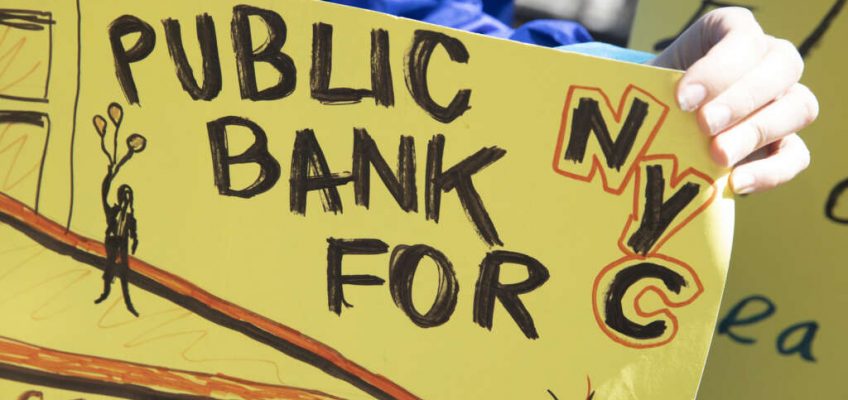“Some say the need for a municipal bank is even greater as the Trump administration plots cuts to housing, green energy and other programs.”
A 2023 rally calling for the city to establish a public bank. (John McCarten/NYC Council Media Unit)
Earlier this month, an obscure government entity, the NYC Banking Commission, voted on which banks city agencies can use over the next two years to deposit tax and other revenue and pay municipal bills. This may seem like little more than a bureaucratic exercise. But with hundreds of millions of dollars sitting in many of these accounts, the choices are far more meaningful than they might seem at first blush.
That’s why some legislators and advocacy groups are pushing for the city to create its own bank—a public bank—that would use these funds to prioritize investments in city needs rather than helping to sweeten the bottom lines of some of the biggest commercial banks in the world.
Some say the need for a municipal bank is even greater as the Trump administration plots cuts to housing, green energy and other programs. Moreover, the administration’s unprecedented order to seize from a city bank account $80 million in aid that had been authorized by Congress—and Citibank’s apparent willingness to go along to avoid regulatory retaliation from the White House if it defied the order—should send a clear message of just who’s interest comes first for many of the big banks.
On April 30, the city’s bank accounts held nearly $2.2 billion in deposits, according to information provided by the Department of Finance. Roughly three-quarters of those funds were in just three banks: JP Morgan Chase ($797.9 million), Bank of America ($684.6 million) and Citibank ($197.4 million). These funds don’t just sit idly in accounts waiting to be drawn down; the banks use them to make investments. The trio of banks were the largest bank investors worldwide in the fossil fuel industry over the years 2016-2023, based on data compiled by the organization Banking on Climate Chaos.
As the city labors to meet the challenges of climate change such as extreme heat, flooding, and related issues, it makes little sense for our public dollars to be used to fuel one of the primary sources of these environmental dangers. Funds in a public bank could instead be directed to help ease these problems locally by financing community solar projects, rooftop farms and building renovations that reduce greenhouse gas emissions.
Likewise, many of the Wall Street banks where the city deposits its funds also are major investors in luxury housing projects that spur gentrification and deepen the city’s shortfall of affordable housing. A public bank, with a mission to use its funds to promote the public good rather than maximize shareholder profits, could provide low-interest loans to nonprofit housing developers and community land trusts that aim to produce truly affordable housing.
Such investments are taking on added import as the Trump administration angles to cut funding for programs that seek to ameliorate climate change and reduce aid that supports affordable housing as well as undermine assistance for underserved communities. As Tousif Ahsan of the New Economy Project said at a May 6 rally, “Through public banks, local governments can responsibly steward public funds—partnering with community-based financial institutions to close critical funding gaps and build wealth in low-income and Black and brown neighborhoods.”
Creating a New York City public bank is also a tool for local economic development—as it has proven to be for more than 100 years in North Dakota. A June 2023 study by the New School Center for New York City Affairs found that just in its early stages, a public bank could spur the creation of 70,600 jobs, more than 17,000 new or renovated housing units and $5.8 billion in lending through local credit unions and neighborhood banks.
“it would represent an alternate model of finance in New York City, one in which finance is not a means of extraction but instead a tool to employ public wealth for public good, enhancing the economic well-being and wealth generating potential for low- and moderate-income New Yorkers and communities,” the report states.
But the city can’t simply put up a sign and open a bank for business. It needs enabling legislation from the state. State Senator James Sanders Jr., chair of the Senate banking committee, has sponsored the necessary legislation for several years. “I’m proud to lead the charge for the New York Public Banking Act, and I urge my colleagues and the governor to make this the year we give our communities the power to build for themselves,” he said at the May rally.
As the current legislative session in Albany winds down, we’ll soon know if his colleagues heed the call.
Doug Turetsky, a former City Limits reporter and editor, was most recently chief of staff and communications director at the New York City Independent Budget Office.
The post Opinion: A Public Bank for the Public Good appeared first on City Limits.


Leave a Reply